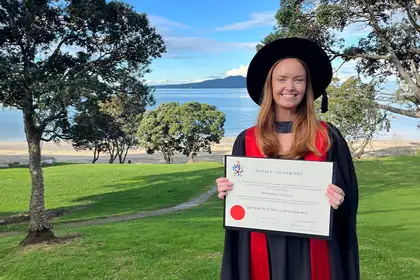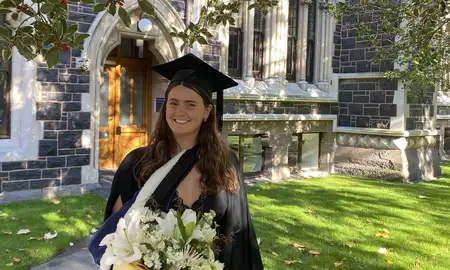
From a young age, Dr Jennison aspired to help others, drawing inspiration from individualsã stories and a desire to understand mental health.
ãThe overlap between mental health and physical health has always been of interest to me, and I was aware of the gaps in our understandings of mental health in those facing physical health concerns ã particularly, what it is like to be a parent/caregiver of a child with cancer, and how that trauma is felt in the long-term after the cancer treatment is completed.ã
The 29-year-old first began her journey at the University of Otago, where she earned a Bachelor of Arts in 2015. Upon completion, she wanted some practical experience in the mental health sector, so volunteered in Sri Lanka and worked in mental health services in London before returning to Aotearoa New Zealand to pursue her doctoral studies at ôÉâ·èÓ.
Her thesis explores the enduring challenges faced by parents/caregivers after their child's cancer treatment, revealing that the trauma and its effects on their perceptions of self and future persist long after medical intervention ends. Her qualitative study highlights the nuanced and ongoing struggles these parents endure, challenging the societal perception that remission marks the end of the cancer experience.
ãI found that participants were significantly impacted by the experience of their child's cancer, particularly on the views they had about themselves, the world, and the future in the long-term. The impact of the cancer did not end when cancer treatment did, instead, the end of cancer treatment was the start of a range of new challenges.ã
Dr Jennison emphasises the importance of understanding and addressing these long-term impacts in clinical practice and hopes her findings will improve support for affected families.
ãI hope my research increases awareness and understanding of the significant challenges for parents and caregivers in the long-term after their child's cancer treatment. We have a societal belief that when cancer is in remission and treatment is completed then society views it as being over, whereas my research highlights the cancer experience as a trauma for parents/caregivers and highlights the chronicity of the cancer experience in the long-term.ã
Reflecting on her doctoral journey, she says the invaluable support from her cohort, supervisors and family was crucial in navigating her time at university.
Now a clinical psychologist, Dr Jennison advises aspiring PhD students to maintain a strong support system and stay curious in their studies.
ãI feel proud that I have completed my Doctor of Clinical Psychology - it has taken me 11 years to get here! I also feel proud of what I have learnt along the way and the friendships I have made.ã
Related news
Scholarship awarded for nutrition research in head and neck cancer patients
Master of Science in Nutrition and Dietetics student Ruby Young has been awarded the universityãs Masterãs Research Scholarship to support her novel study into the nutrition perceptions of people with head and neck cancer.
